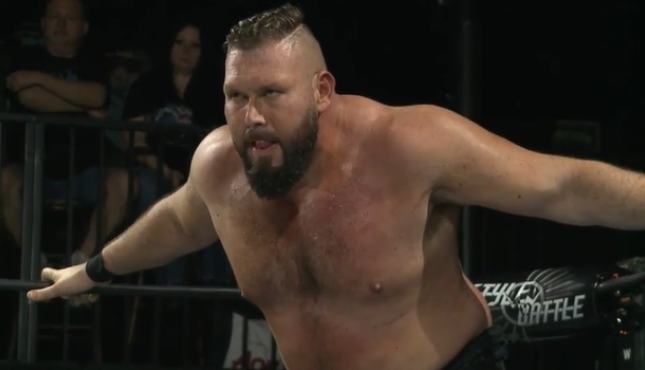wrestling / News
Indie Wrestler Mike Parrow Opens Up About Coming Out as Gay, Inspiring Others & More

– Orlando-based independent wrestler Mike Parrow spoke with Gay Star News for a new interview about his struggle to come out as gay. Parrow, who has worked for EVOLVE and MLW, has spoken publicly about his sexuality for the first time, four years after he told friends, family and his fellow wrestlers. He came out to those close to him at about the same time he met the man he is now engaged to. Some highlights from the interview are below:
On his struggles to come out: “I’ve always known I’m gay. That was never a question in my mind. But growing up, I went to Catholic school my whole life. My mom’s a Sunday school teacher. I came from a small town in upstate New York. It didn’t have a flourishing gay community. The only exposure I saw of any gay culture was extremely effeminate and that was what was on TV. I’m not like Jack on Will and Grace, so I’m not gay. [I remember thinking,] ‘Maybe it is a choice.’ So I tried to hide it. I played football and did manly stuff. It wasn’t because I was gay. Those were the things I gravitate to – competitive stuff.”
On dating women to hide his sexuality when he was younger: “In the beginning, when you’re younger, it’s easy – you’re young. But the older I got, the harder it got for me to have any kind of emotional relationship with a woman. I would find ways to end it. I’d be like, “Listen, I just don’t think you’re pretty.” And I was kind of mean to some women. It’s wrong. And I wish sometimes I could have that back.”
On seeking help to deal with his sexuality: “I prayed to God and said, ‘Hey, show me what I need to do. Just show me a sign. Show me something: Am I gay? Am I straight?’ Because I did try to pay for conversion therapy. It was an absolute joke. Kind of hilarious. Basically, it was just them saying, ‘We’re going to set you up with girls and that’s what you’re going to like.’ What, all of a sudden? Um, no! That’s the whole point. We don’t like girls! And I saw a psychiatrist, and the psychiatrist said, ‘There’s nothing wrong with you. You’re depressed because you’re gay!’ So I’m like, ‘I wanna fix that!’ The psychiatrist is like, ‘That’s something you can’t fix.’ Which I laugh at now, but at the time I was serious. ‘No, I want to fix it.'”
On the reaction from other wrestlers when he comes out to them: “It’s weird, the higher up you go, no – they’re awesome. The two companies that I mainly work for have been awesome. But when you’re wrestling in the backwoods of like Georgia, I have come across a couple of guys that… I wouldn’t say were uncomfortable wrestling with me, but there has been the odd comment. When I personally hear those things I address it. So, I will go up to them and say, ‘If you have a problem, we can discuss this.’ I don’t let it sit and roll off me, and maybe sometimes I should but, I do like to address things. Especially the locker room, because a locker room setting is extremely different to everyday life. You get a lot of different things said in locker rooms that you’d never say in real life. People will throw slurs around left and right, so I just address it when I feel like it’s gone too far. Maybe it’s not towards me, but if it’s gone too far, I will address them. I’ll say, ‘Do you really think that’s necessary right now?’ I find, especially with a lot of wrestlers, they have a lot of questions. A lot of questions. I’m open and honest when people ask me questions. So, I’ve not necessarily had hatred towards me. More curiosity.”
On wearing the number 49 in honor of those who died in the Pulse Nightclub shooting: “I lost a lot of people [at Pulse] that, when I was coming out and was scared, were telling me, ‘Stop being so scared and help people.’ I said, ‘What do you mean by help people?’ One of the girls that lost her life, she told me, ‘You don’t understand. You are important. You do have a voice and you need to show people, especially with what you do, that it’s OK to be gay.’ She herself played basketball. She said, ‘When you’re a kid, it’s very hard to tell your friends that you’re gay because there’s really no role models for young, gay athletes, because everything you see on TV is stereotypical. It might be you are able to help a 14-year-old or 15-year-old from deciding to kill themselves because they don’t have a role model.’ That really stuck with me, especially after what happened. After Pulse happened, it gives me my drive to be myself. That’s why I wear the 49. To honor them and be myself. To remind me that you do need to tell people. They do need to understand that not everybody’s the same, that everybody has a journey: You need to keep going forward.”







